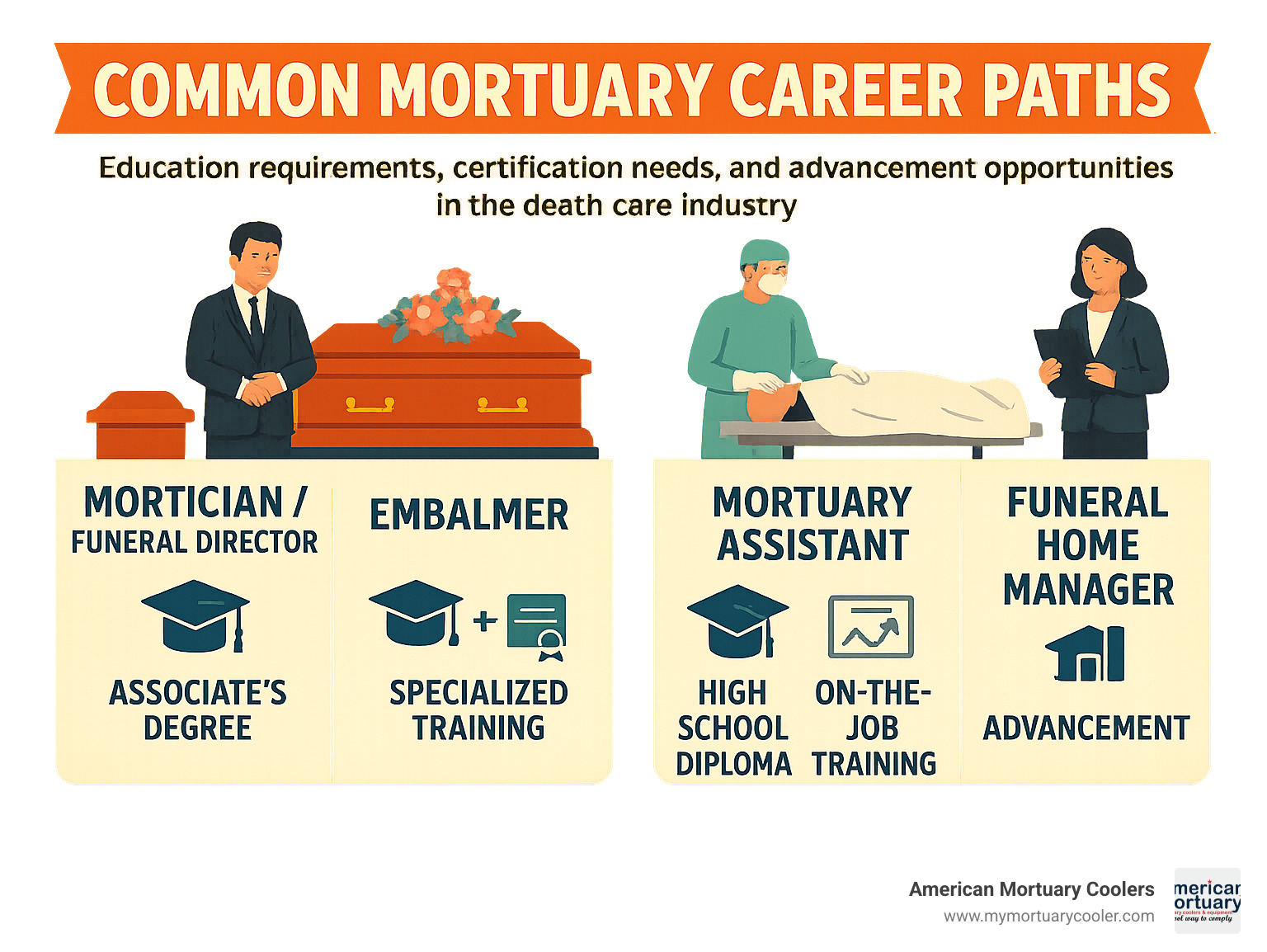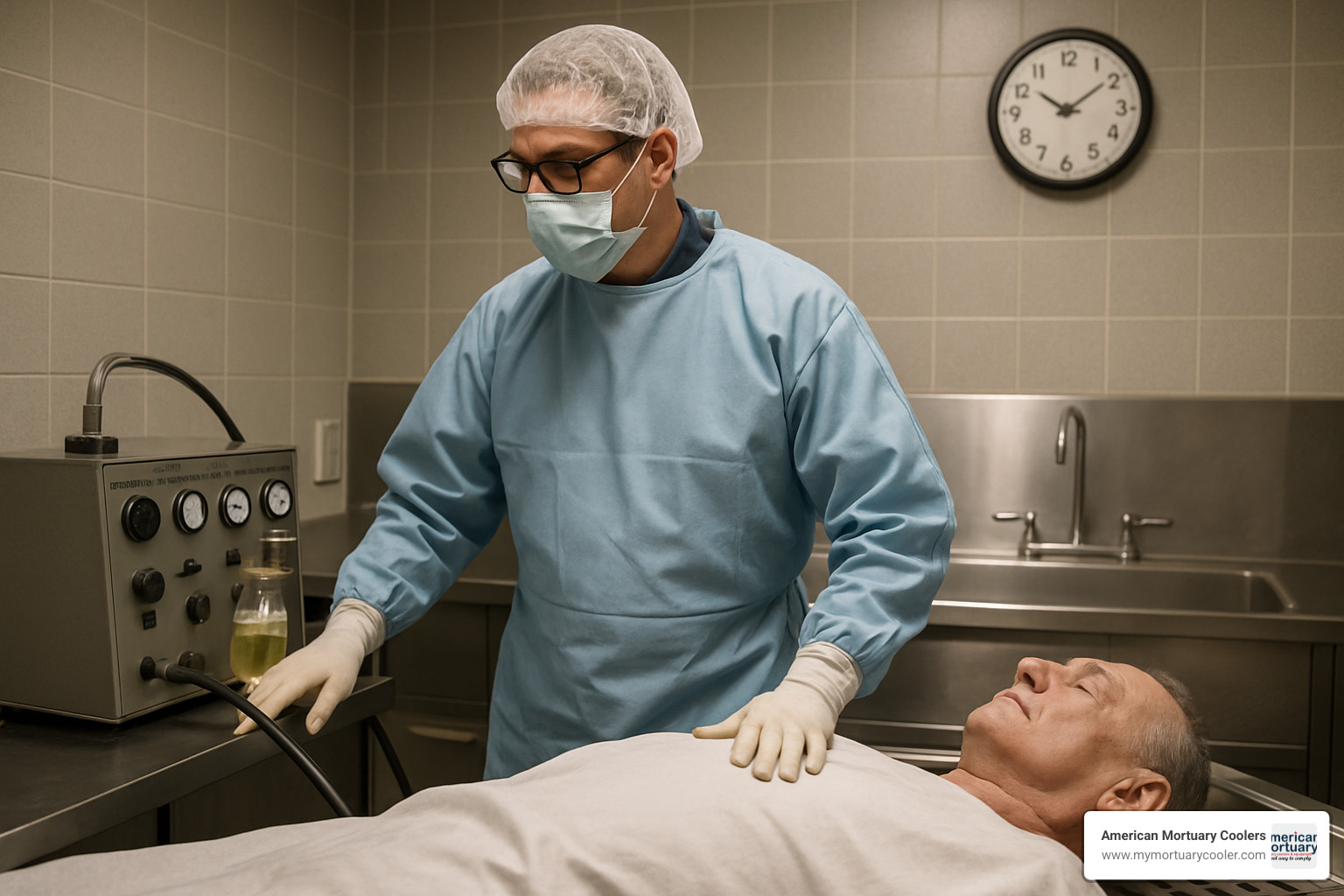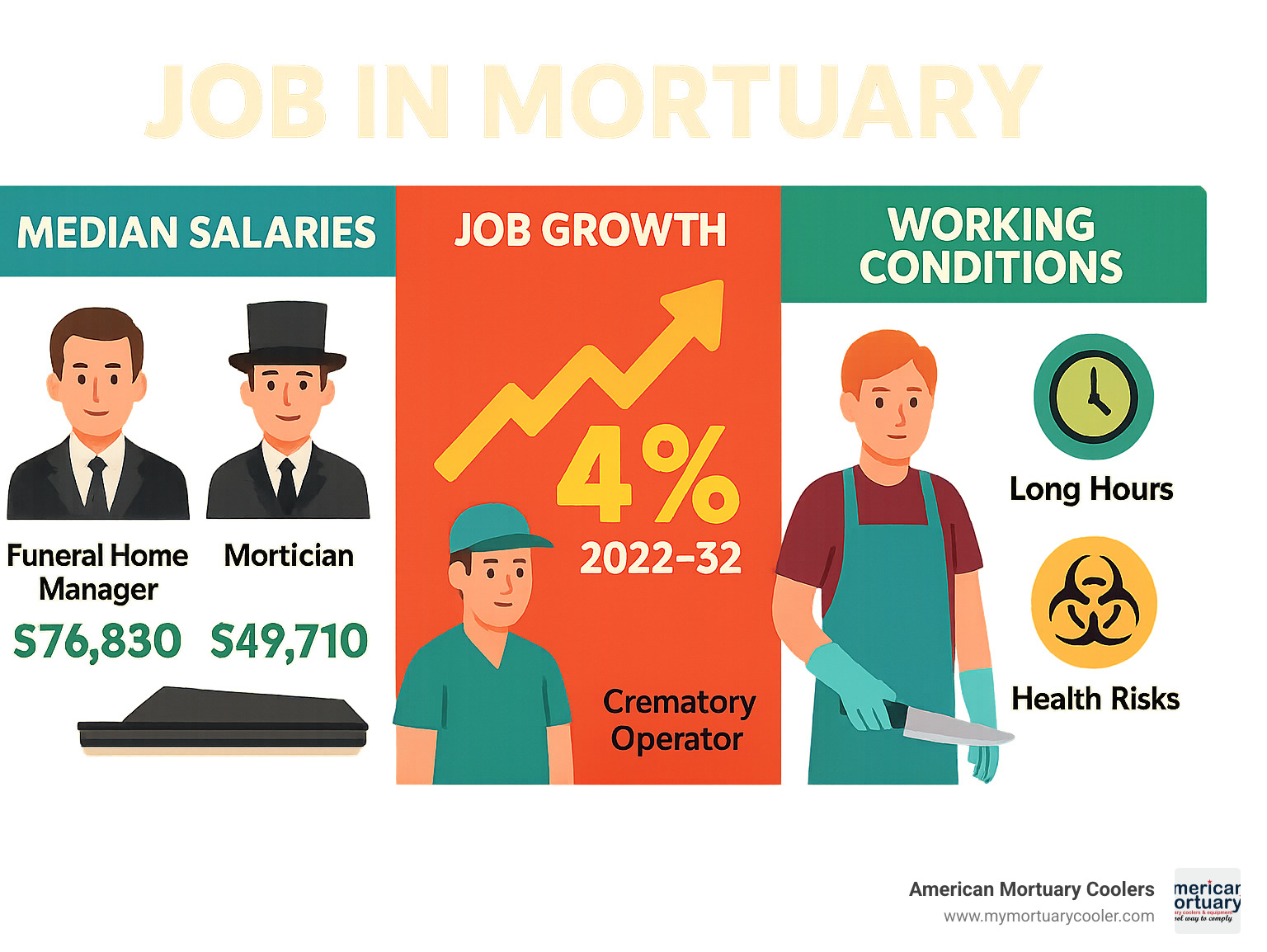
7 Brilliant and Unconventional Ways to Find a Job in Mortuary Services
Finding Your Path in the Death Care Industry
Looking for a job in mortuary services? Here's a quick overview of the main career options:
| Mortuary Job Title | Key Responsibilities | Typical Education | Median Annual Salary |
|---|---|---|---|
| Mortician/Funeral Director | Arranging services, client consultations, business management | Associate's degree in mortuary science | $59,420 |
| Embalmer | Body preparation, preservation, cosmetic restoration | Associate's degree + specialized training | $49,800 |
| Mortuary Assistant | Supporting embalmers, cleaning facilities, transport | High school diploma + on-the-job training | $35,000-$45,000 |
| Morgue Attendant | Body handling, assisting with autopsies, record keeping | High school diploma + on-the-job training | $30,000-$40,000 |
| Funeral Home Manager | Staff supervision, operations oversight, financial management | Bachelor's degree + experience | $76,830 |
A job in mortuary services offers a unique career path that combines technical skills with compassion. While many people find the idea of working with the deceased uncomfortable, those drawn to this field find meaningful work helping families through their most difficult moments. The mortuary industry provides stable employment with approximately 5,800 job openings annually across the United States, and a projected 4% growth rate through 2033.
I'm Mortuary Cooler, a national-level supplier of mortuary refrigeration systems with extensive experience working alongside professionals in various job in mortuary settings across the country. I've witnessed how proper equipment supports the critical work of mortuary professionals while enhancing workplace safety and efficiency.

Job in mortuary terms made easy:
7 Brilliant and Unconventional Ways to Land a Job in Mortuary Services
Breaking into the mortuary industry can feel like trying to join a private club - especially without family connections in the business. At American Mortuary Coolers, we've worked alongside funeral professionals nationwide and gathered insider knowledge on how successful candidates secure positions in this specialized field.

With only about 61,000 funeral service worker jobs across the country, the competition can be surprisingly fierce. Standing out requires more creativity than simply clicking "apply" on job boards. Here are seven strategies that have helped our most successful colleagues find their place in mortuary services.
Way 1: Fast-Track Through Accredited Mortuary Science Programs
The most direct path to a job in mortuary services starts with proper education. Programs accredited by the American Board of Funeral Service Education (ABFSE) are your golden ticket.
What makes this approach particularly effective is targeting programs with exceptional job placement rates. Some mortuary science programs boast placement rates exceeding 90%, with students often receiving job offers before they've even tossed their graduation caps.
To make this strategy work for you, focus on schools with established relationships with funeral homes in your desired location. Look for programs that include hands-on internships or practicum components - these real-world experiences often lead directly to job offers. Reach out to alumni on LinkedIn to learn about their experiences, and attend program open houses to meet faculty members who often maintain strong industry connections.
Most states require funeral directors and embalmers to complete an associate's degree in mortuary science, pass national board exams, and complete a 1-3 year apprenticeship. By choosing a program with strong industry connections, you're essentially putting yourself on the fast track.
For more details about educational pathways, check out our guide to mortuary science degrees.
Way 2: Shadow & Volunteer in Hospital Morgues Before You Apply
Hospital morgues can be your foot in the door when seeking a job in mortuary services. While funeral homes may hesitate to take on volunteers due to privacy concerns, hospitals often have established volunteer programs that can include morgue experience.
Morgue attendant positions typically require less formal education than funeral directors or embalmers - generally just a high school diploma with on-the-job training. By volunteering, you demonstrate your comfort level in this unique environment, build hands-on experience, and develop relationships with pathologists and morgue supervisors who can later become your references.
To implement this strategy, reach out to volunteer services departments at local hospitals. Express specific interest in shadowing opportunities in the morgue or pathology department. Be prepared for background checks and training requirements. Even if direct morgue access isn't immediately available, volunteering elsewhere in the hospital can create valuable internal networking opportunities.
The experience you gain handling essential tasks like recording information, preparing deceased individuals, maintaining equipment, and assisting pathologists makes you a much more attractive candidate when formal positions become available.
Way 3: Leverage Professional Bodies for Insider Openings
Some of the best job in mortuary opportunities never make it to public job boards. They're quietly filled through professional networks within industry associations like the National Funeral Directors Association (NFDA), Cremation Association of North America (CANA), and International Cemetery, Cremation and Funeral Association (ICCFA).
Membership in these organizations gives you access to exclusive job listings, networking events where hiring managers actively scout for talent, continuing education opportunities, mentorship programs, and industry publications featuring job openings.
Join as a student member (typically at reduced rates) and become an active participant in regional meetings and national conventions. Volunteer to help at events - this puts you in direct contact with funeral home owners and directors who make hiring decisions. These connections often lead to job offers that were never publicly advertised.
For a quick overview of funeral careers and how professional associations can help, this informative video on funeral careers provides valuable insights.
Way 4: Scan Tech-Driven Job Boards & Niche Career Sites
While general job sites occasionally list mortuary positions, specialized platforms offer more targeted results for finding a job in mortuary services. Zippia provides detailed information about mortuary careers, including salary data and growth projections. The government-sponsored CareerOneStop offers comprehensive information about funeral service occupations. The NFDA Career Center specializes in funeral service job listings.
Don't overlook state funeral directors association websites, which often maintain regional job listings, and mortuary school job boards, which frequently post opportunities specifically for their students and alumni.
Be tech-savvy in your approach. Set up custom alerts with specific keywords like "morgue technician," "mortuary assistant," "embalmer," or "funeral apprentice" to receive notifications when new positions appear. Use Boolean search operators to refine results and find exactly what you're looking for.
According to our research, about 5,800 job openings for funeral service workers are projected each year over the next decade. Many of these openings result from retirements or career changes, creating steady opportunities for newcomers to the field.
Way 5: Turn Prep-Room Skills Into a Portfolio to Secure a Job in Mortuary
A professional portfolio showcasing your technical skills can dramatically increase your chances of landing a job in mortuary services, especially for preparation room positions. Include documentation of any specialized training you've received, certificates from workshops or courses in embalming techniques or restorative art, and evidence of your OSHA compliance knowledge.
If permitted and with appropriate consent, include before/after photos of restorative work (many schools create practice scenarios specifically for portfolio building). Demonstrate your equipment proficiency and highlight continuing education you've pursued.
Present your portfolio professionally, either as a physical collection in a quality binder or as a digital portfolio on a personal website that potential employers can easily access. Include testimonials from instructors or supervisors who can speak to your technical abilities and professional demeanor.
At American Mortuary Coolers, we've seen that candidates who demonstrate familiarity with preparation room equipment and procedures have a significant advantage in the hiring process. Funeral homes value candidates who can step into technical roles with minimal additional training.
For more insights into daily responsibilities in mortuary preparation rooms, read our article on The Ins and Outs of a Day in the Life of a Mortician.
Way 6: Attend Equipment Vendor Workshops & Trade Shows
Equipment manufacturers and suppliers like us at American Mortuary Coolers frequently host workshops and participate in trade shows that offer excellent networking opportunities for those seeking a job in mortuary services.

These events give you direct access to funeral directors who attend to evaluate new equipment. Your presence demonstrates your commitment to the profession, while workshops provide valuable hands-on experience with the latest technology. Suppliers often know which funeral homes are expanding or hiring and may be willing to make introductions.
Follow equipment manufacturers on social media to learn about upcoming workshops and register for regional and national funeral service conventions. Participate actively in demonstrations and ask thoughtful questions that showcase your knowledge and interest. Collect business cards and follow up with personalized emails. Consider volunteering to help at these events for greater access to exhibitors.
We've seen funeral directors become genuinely impressed by candidates who demonstrate knowledge of preparation room equipment and best practices. Understanding the technical aspects of mortuary operations signals that you're serious about the profession.
Way 7: Relocate or Offer On-Call Removal Services to Land a Job in Mortuary
Geographic flexibility can significantly increase your opportunities for finding a job in mortuary services. Rural areas and smaller communities often struggle to find qualified mortuary professionals, creating opportunities for those willing to relocate.
With less competition for positions in less populated areas and higher demand for qualified professionals, you might find yourself advancing more quickly than you would in urban settings. Smaller operations often offer broader responsibilities, allowing you to gain experience across multiple aspects of funeral service.
Another entry point is providing on-call transport services, which require less formal education but demonstrate your reliability and comfort level with the profession. Requirements typically include a valid driver's license with a clean record, the ability to lift and move deceased individuals, professional demeanor, availability for on-call shifts, and basic training in safe handling procedures.
At American Mortuary Coolers, we service funeral homes across all 48 contiguous states and have observed that many rural funeral homes struggle to find qualified staff. Being willing to relocate to underserved areas can fast-track your entry into the profession and provide valuable experience that will serve you throughout your career.
Essential Qualifications, Skills & Tools Employers Look For
When it comes to landing a job in mortuary services, knowing exactly what employers are searching for can be your secret weapon. Having worked with funeral professionals across the country at American Mortuary Coolers, we've gathered insights on what truly makes candidates stand out in this unique field.

Most states have clear pathways to becoming a licensed funeral professional. You'll typically need an associate's degree in mortuary science from an ABFSE-accredited program – think of this as your foundation. After completing your coursework, you'll face national board exams covering both Arts and Sciences components. Don't worry though – most programs specifically prepare you for these challenges.
The journey doesn't end with passing exams. You'll need to complete a 1-3 year apprenticeship under a licensed professional, which is where you'll truly learn the art and science of the profession. Many states also require you to be at least 21 years old for licensure, and once licensed, you'll need continuing education to keep your credentials current.
Beyond the formal requirements, the personal qualities that make someone excel in a job in mortuary services are equally important. Emotional resilience tops the list – you'll be working with grieving families during their most vulnerable moments. Compassion naturally follows, as genuine empathy forms the cornerstone of providing comfort to those in mourning.
I've spoken with countless funeral directors who emphasize that attention to detail can make all the difference, whether you're preparing a deceased person or handling paperwork for a service. Your communication skills need to be top-notch too – you'll be explaining sensitive processes to families who may be in emotional distress.
The physical aspects of the job shouldn't be overlooked either. Physical stamina is essential, as you'll often stand for extended periods and need the strength to move and position deceased individuals with dignity. Strong organizational abilities help you manage multiple services and deadlines simultaneously, while cultural sensitivity ensures you can respectfully accommodate diverse religious and cultural funeral practices.
On the technical side, employers value candidates who come in with knowledge of mortuary equipment and procedures. Familiarity with embalming equipment like pumps, tubes, and aspirators demonstrates your readiness for preparation room responsibilities. Understanding proper personal protective equipment (PPE) protocols shows your commitment to safety.
Knowledge of mortuary coolers – including temperature requirements and proper storage techniques – is particularly valued (and something we're passionate about at American Mortuary Coolers). Skills in cosmetic restoration help you present the deceased in a way that brings comfort to families. Proficiency with computer systems for case management and funeral vehicles rounds out the technical toolkit that makes candidates appealing to employers.
For a deeper dive into the equipment you'll encounter in this profession, our article on Essential Mortuary Equipment: A Professional's Guide to Key Funeral Supplies provides a comprehensive overview.
The beautiful thing about pursuing a job in mortuary services is that while the requirements might seem numerous, each one serves a purpose in preparing you to provide compassionate, professional care during life's most difficult moments. With the right combination of education, skills, and personal qualities, you'll be well-positioned to build a meaningful career in this essential field.
Salary, Work Environment & Career Outlook Snapshot
Before pursuing a job in mortuary services, it's important to understand what you're signing up for – from your paycheck to your daily work life, and whether jobs will be available in the years ahead.

Salary Expectations:
Let's talk money. The median annual pay for funeral service workers in 2024 sits at $59,420, though your actual earnings will vary based on your specific role in the industry. Funeral home managers tend to earn the most at around $76,830, while morticians and funeral arrangers typically earn closer to $49,800. If you're just starting out as a mortuary assistant or morgue attendant, expect somewhere between $30,000 and $45,000.
Where you work matters too. Urban funeral homes generally offer higher salaries than rural ones, though the cost of living is also higher. Your experience level, any special certifications you hold, and the size of the facility you work for will all influence your paycheck. Some states with stricter licensing requirements also tend to have higher compensation.
Work Environment and Schedule:
I won't sugarcoat it – working in mortuary services means embracing some unique working conditions. Irregular hours are part of the package, as death doesn't follow a 9-to-5 schedule. Many positions require you to be on-call for death calls, sometimes 24/7. Weekends, evenings, and yes, even holidays, are often workdays in this profession.
The emotional demands are significant. You'll regularly interact with grieving families during their worst moments, which requires tremendous emotional resilience. Physically, you'll spend long periods standing, and yes, lifting and moving deceased individuals is part of many mortuary roles.
There are also health considerations to be aware of. You'll likely be exposed to embalming chemicals and potential biohazards, though proper protective equipment minimizes these risks. And while we're talking about appearances – most client-facing roles require professional, formal business attire.
At American Mortuary Coolers, we've equipped hundreds of preparation rooms across the country, and we've seen how proper equipment can make these working conditions more manageable and safer for professionals.
Career Outlook:
The good news is that mortuary services remain a stable career path. Employment is projected to grow at about 4% from 2023 to 2033, which is on par with the average for all occupations. This translates to approximately 5,800 job openings annually across the country – mostly to replace workers who retire or change careers.
Several trends are reshaping the industry. The increasing preference for cremation (which requires fewer staff than traditional burial) is changing workforce needs. At the same time, more families are requesting personalized memorial services, which creates demand for professionals with creative planning skills. Pre-need funeral planning is becoming more common, and we're seeing continued consolidation of independently owned funeral homes into corporate chains.
Green burial methods and alternative disposition options are also emerging as consumer preferences evolve. These shifts mean that professionals who can adapt to changing consumer preferences will find the most opportunities.
Despite these changes, we've observed that professionals with solid technical skills in embalming and preparation, combined with genuine interpersonal abilities, remain in consistently high demand.
For the most current regional wage data, you can visit the Bureau of Labor Statistics occupational wage data tool to see what professionals in your area are earning.
Frequently Asked Questions about Finding a Job in Mortuary Services
How long does licensure take for an entry-level mortician?
Becoming a licensed mortician isn't an overnight process, but the journey is well worth it for those called to this meaningful profession. If you're considering a job in mortuary services, understanding the timeline helps set realistic expectations.
Most states follow a similar path to licensure, though specific requirements vary. You'll typically spend 2-4 years completing your mortuary science degree (associate's or bachelor's), followed by sitting for the National Board Exams during your final semester or shortly after graduation.
The apprenticeship phase usually lasts 1-3 years, where you'll work alongside experienced professionals learning the nuances of the trade. Some states allow you to complete this concurrently with your education, which can save time. The final step—state licensing approval—generally takes 1-3 months once all other requirements are met.
All told, expect 3-7 years from your first mortuary science class to holding your license. During my travels installing coolers across the country, I've noticed many funeral homes actually prefer to hire students as assistants or removal staff while they complete their education. This arrangement works beautifully for both parties—you gain invaluable hands-on experience (and income) while the funeral home develops a potential future licensed staff member who already understands their specific practices.
What personal qualities matter most to hiring funeral homes?
When I visit funeral homes to install or service mortuary coolers, directors often chat about their staffing challenges. What's fascinating is how consistently they emphasize character over technical proficiency when looking for someone to fill a job in mortuary services.
Emotional intelligence tops the list—the natural ability to read a room, sense what a grieving family needs, and respond with appropriate compassion without becoming overwhelmed yourself. This quality can't be taught in mortuary science programs but makes all the difference in family satisfaction.
Professionalism and reliability are equally critical. Funeral directors need staff who maintain appropriate boundaries, present themselves well, and show up dependably for on-call shifts. Death doesn't follow a 9-to-5 schedule, and neither can mortuary professionals.
Adaptability, discretion, team orientation, and problem-solving round out the list of most-valued traits. I remember one funeral director telling me, "I can teach someone how to embalm, but I can't teach them to care genuinely or think on their feet when a service goes sideways."
Showcasing these qualities during interviews and apprenticeships will set you apart from other candidates, even those with more technical experience. Funeral homes are entrusting you with their reputation in the community during families' most vulnerable moments.
Are there advancement routes beyond funeral directing?
The mortuary field offers surprisingly diverse career paths beyond the traditional funeral director role. I've watched many professionals evolve their careers in fascinating directions over my years working with funeral homes across the country.
Ownership or management represents one common advancement route—about 58% of funeral home managers are self-employed, either purchasing existing establishments or starting new ones. This entrepreneurial path appeals to those with both technical funeral knowledge and business acumen.
Specialization offers another rewarding path. Some professionals become known for their expertise in restorative art for traumatic cases, while others develop specialties in green burial practices, specific cultural funeral traditions, or grief counseling. These niche skills often command premium compensation.
Education and consulting provide options for those who enjoy sharing knowledge. Teaching in mortuary science programs or advising funeral homes on business operations lets you leverage your experience while potentially enjoying more regular hours.
Many mortuary professionals also transition to allied industries. At American Mortuary Coolers, we've hired several former funeral directors who bring invaluable insights from their hands-on experience. Similar opportunities exist with casket manufacturers, embalming chemical companies, cemetery operations, and preneed insurance sales.
The transferable skills developed in mortuary work—meticulous attention to detail, project management, client relations, and composure under pressure—prove valuable in countless related fields. Your mortuary science background can be the foundation for a lifelong career that evolves with your interests and lifestyle needs.
Conclusion
Finding a job in mortuary services isn't just about submitting applications—it's about showing the world you have both the technical skills and compassionate heart this unique profession demands. The strategies we've shared come from years of watching dedicated professionals find their place in this meaningful field.
I've seen how the most successful mortuary professionals blend scientific precision with genuine empathy. On Monday, you might be carefully preparing a loved one for viewing, and by Tuesday, you're sitting with a family, helping them steer their grief. This beautiful balance of science and compassion is what makes mortuary work so fulfilling.
At American Mortuary Coolers, we're honored to play a small part in supporting your important work. When I visit funeral homes across the country delivering our custom-built mortuary coolers, I'm always moved by the dedication I witness. Your commitment to serving families during their most vulnerable moments deserves reliable equipment that never lets you down.
If you're just starting your journey toward a job in mortuary services, don't get discouraged by initial challenges. The path may take time—from education to apprenticeship to licensure—but the destination is worth it. For those already in the field looking to advance, your experience is incredibly valuable, whether you're aiming for ownership, specialization, or moving into allied industries.
The mortuary profession offers something rare in today's world: meaningful work that truly matters to the families you serve. Every time you help a family honor their loved one with dignity and care, you're creating moments of comfort that will be remembered for generations.
For those interested in learning more about the equipment that supports this important work, our guide to one-stop mortuary coolers provides helpful information about the tools of the trade.
Working in mortuary services isn't just employment—it's answering a calling to stand with people during life's most difficult transitions. With preparation, persistence, and heart, you'll find your place in this profession that combines technical expertise with profound human connection.



